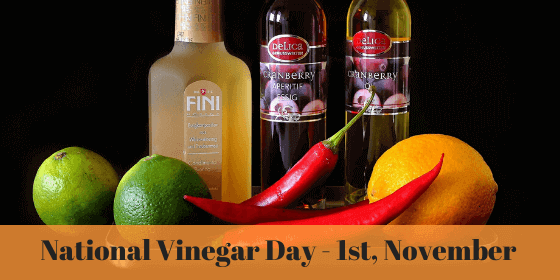National Vinegar Day 2024: History, Activities, Significance

There are therefore two types of vinegar that most people associate with vinegar, the majority of which are white vinegar that comes in plastic jugs and is crystal clear. The other variety is balsamic vinegar, a thick, almost syrup-like culinary black magic that attracts more flies than honey. In addition to this, there are a plethora of vinegar flavors and preparations that most people have never heard of. The goal of National Vinegar Day is to change all that by educating you about the mouthwatering variety of flavors that vinegar can create.
When is National Vinegar Day
A common ingredient in cooking, home cures, and science experiments. Today, we’re discussing and honoring vinegar, one of the kitchen’s mysteries that looks equally at home in the pantry as it does under the sink. With so many uses, advantages, and recipes available, it’s no surprise that the entire nation will observe National Vinegar Day on November 1.
National Vinegar Day History
When the natural fermentation process is unregulated or purposefully permitted to continue, it results in vinegar instead of wine. It is essential to the pickling process, which allows a wide variety of foods to be preserved, and has a particular flavor that is utilized to enhance the flavors of countless other recipes. You might be shocked to learn just how many things—from the very obvious pickle to the mildly odd ketchup—contain vinegar.
How many different kinds of vinegar exist? Balsamic vinegar, red wine vinegar, white wine vinegar, apple cider vinegar, distilled white vinegar, champagne vinegar, rice vinegar, sherry vinegar, and a plethora of additional variants too numerous to list are some of the most fundamental types. There are more than you could possibly think. Additionally, you may find each of these packed with particular herbs and spices to create a distinctive experience and provide a distinctive flavor to every dish they touch.
When refrigeration hadn’t yet been developed and salt was as valuable as gold, vinegar was revered throughout history for its preservation properties as well as the light tart flavor it imparts to many foods. National Vinegar Day serves as a reminder to try these many varieties.
National Vinegar Day Activities
The ideal way to recognize National Vinegar Day is to visit a specialty shop and buy a variety of vinegar to sample. The same can be done with olive oil if you’re feeling inventive; the two combine flawlessly to make the well-known vinaigrette salad dressing. Serve these two ingredients besides a cut loaf of French bread and little bowls with a sample of each in each. One or both, with your bread, and savor the tastes they impart.
National Vinegar Day Significance
The original preservation agent
The Babylonians were thought to have fermented palm dates as early as 5,000 BC to produce both palm wine and palm vinegar. We can make assumptions about what they did with the wine, but the interesting part is what they did with the vinegar. This was perhaps the first time food was preserved by pickling so it could be eaten later. This is still one of vinegar’s most beneficial qualities now, 7,000 years later.
A panacea for food
The distinct flavor and qualities of vinegar interact beautifully with regular components. In particular, vinegar can perk up a dish that lacks flavor or salvage one that could be a little too spicy for some diners. However, it only takes a few dashes for the food molecules to begin to react, so use caution. If not, you risk consuming only foodstuffs with salt- and vinegar-flavored flavors.
A fantastic science experiment element
In addition to the typical volcano, vinegar can be an effective teaching tool for students to learn the fundamentals of chemistry. Many experiments can demonstrate the effects of CO2 on fire, the effects of vinegar on eggs, and how to construct your own battery.




